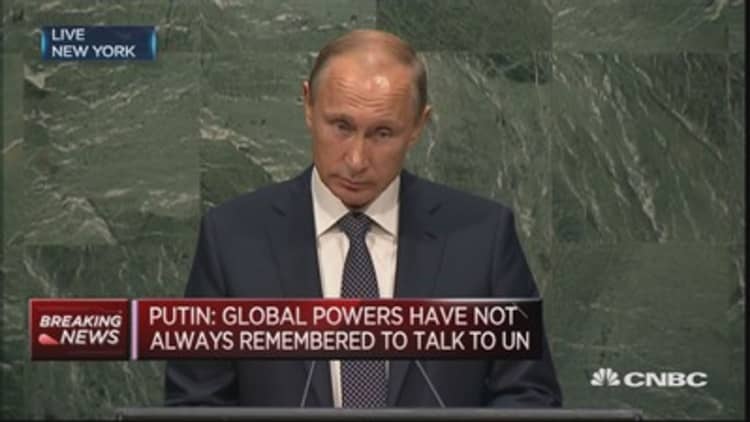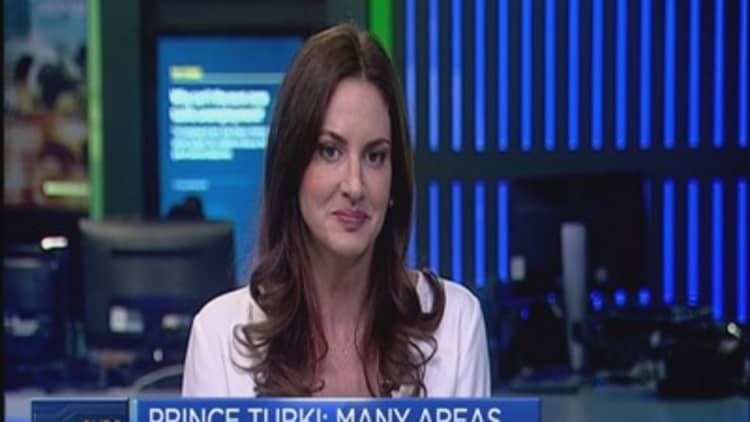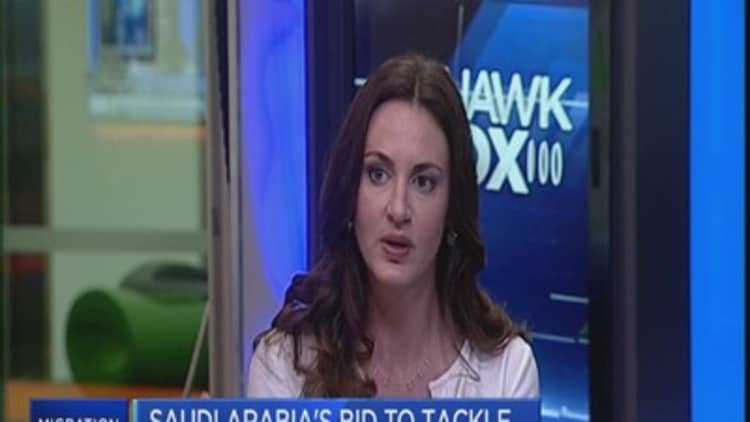


Russia may hope that using its military in Syria could help end European economic sanctions down the line, Kremlin watchers told CNBC, though Russia's ability to put significant force in the Middle East is hampered by its own financial struggles.
Ahead of President Vladimir Putin's planned meeting with President Barack Obama on Monday, Russia is expanding its military operations in Syria. Though still small compared with U.S. capabilities in the region, Russia is believed to have warplanes in Latakia, Syria, and it announced an intelligence-sharing pact with Syria and Iran on Sunday. All three nations are sworn enemies of ISIS, also known as the Islamic State.
Donald Jensen, senior fellow at the Center for Transatlantic Relations, said that Russia wants to protect a long-time ally and distract international attention from its existing military operations into Ukraine. But Putin also may believe that a role in Syria could help Russia strike a deal to lift economic sanctions from the European Union that have crippled its economy since it began supporting insurgents in Ukraine, he said.
Europe has been hit by a massive inflow of refugees fleeing fighting in Syria and elsewhere, a flow that shows no signs of slowing. Eurasia Group President Ian Bremmer agreed that Russia could be angling to get European sanctions lifted, "as the Europeans consider Syria and the refugee crisis more important."
Moscow believes that a struggling U.S. policy in the region is leaving a vacuum, which is both an opportunity and a problem for Russia, said Robert Legvold, the Marshall D. Shulman Professor Emeritus of political science at Columbia University.
"It is an opportunity to appear a constructive and major player, but also risks dragging Russia into a morass from which no outsider is going to benefit," he said.



And Russia already faces a major budget shortfall that has come in part from its rising military expenditures. The country still supports antigovernment insurgents in Ukraine, even though the Russian federal budget deficit for 2015 is expected to come in at $40 billion, or 3 percent of its gross domestic product, according geopolitical research firm Stratfor. That said, Russia has refrained from making any cuts to its military budget so far.
High-level U.S. officials have hinted at a possible working relationship with Russia when it comes to Syria—though with preconditions, the chief one being the ouster of Syrian President Bashar al Assad, whom the Obama Administration and some of its allies oppose but who is a long-time friend of both Russia and Iran. Resolving Assad's fate will be "incredibly difficult," said RBC Capital Markets Chief Commodities Strategist Helima Croft.
"While Russians are keen on keeping him until there is an acceptable transition figure, the GCC (Gulf Cooperation Council) leaders and Turkey are adamant that he must go and cannot remain in office even for a transitional period," Croft said. "So even if Obama was inclined to accept a Putin plan—which I think is unlikely—it may be a moot point without these countries' support."

Matthew Rojansky, director of the Kennan Institute at the Wilson Center, disagreed with the notion that a Russian role in Syria will have an impact on sanctions, but he expressed no surprise that Russia is making a foray into the region.
"I don't think Putin or anyone else has illusions this will lead to lifting of sanctions; however, it's a very smart and in many ways justified Russian move," Rojansky told CNBC.



